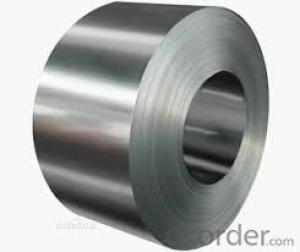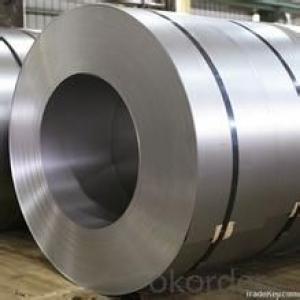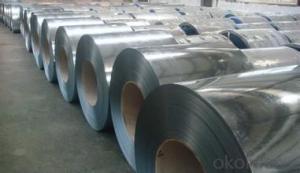Cold Relled Steel Coil/Plates with High Quality in CNBM
- Loading Port:
- Tianjin
- Payment Terms:
- TT OR LC
- Min Order Qty:
- 100 m.t.
- Supply Capability:
- 89000000 m.t./month
OKorder Service Pledge
OKorder Financial Service
You Might Also Like
Description of cold rolled steel coil :
The raw material of cold rolled steel coil/sheet is high quality hot rolled product, and after pickling, kinds of new technology and new process of global cold rolling production have been applied. Therefore the manufacturing, home appliance, automobile etc.
Specification of cold rolled steel coil :
standard | AISI, ASTM, DIN, GB, JIS |
Steel Grade | Q195/Q195L/st12/dc01/spcc |
Thickness | 0.15-1.5mm |
Width | 500-914mm |
Length | coil |
Place of Origin | Shandong,china(mainland) |
Producing ablity | 500,000 Tons/month |
Type of payment | T/T, L/C |
Packing | As per customer's requirement |
Delivery | 30days after contract |
Price | FOB&CIF |
MOQ | 20Tons |
Packaging & delivery of cold rolled steel coil :
Packaging Detail: | Oil coated, metal shell and anti-rust paper with corner protected by sheet or coil |
Delivery Detail: | 30 days after receiving deposit or L/C |
Application of cold rolled steel coil :
1. Refrigerators, cabinets, power distribution baords and drums.
2. Automobile floor and roof panels.
3. Automobile fenders and quarter panels
4. Automobile fenders and quarter panels
Images of cold rolled steel cold rolled steel coil:
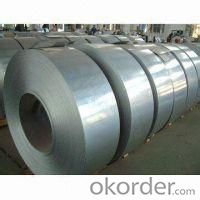
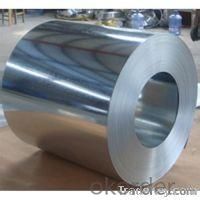
- Q:Suppose that the hardness of steel is uniformly distributed, taking on values between 50 and 80 on the Rockwell B scale.Compute the probability that the hardness of a randomly selected steel specimen is less than 60. a..462b..333c..500d.2e..750 Question 8 Refer to question 7. Compute the probability that the hardness of a randomly selected steel specimen is between 70 and 75.a..167b..500c..063d..100e..
- Suppose that the hardness of steel is uniformly distributed, taking on values between 50 and 80 on the Rockwell B scale. That would be... f(x) = 1/(80 - 50), 50 ≤ x ≤ 80 . . . . . 0 elsewhere Consider this following problem.. Compute the probability that the hardness of a randomly selected steel specimen is less than 60. Here, we have... P(x 60) Oh! Know that the mean and the standard deviation of the uniform distribution function are... ? = (a + b)/2 σ = (a - b)?/12 You should get... ? = 65 σ = 75 Now... P(z (60 - 65)/75) = P(z -0.07) Hence, you should get around 0.462. Good luck!
- Q:I recently got in a car accident with a steel mailbox, on a snowy day. I was wondering if i can do anything since the steel mailbox caused my car to be totaled. Otherwise it would have been fine and would have suffered only minor damage. Anything I can do here to maybe get some money back? Thanks!
- Let me get this straight. You were driving too fast for conditions, lost control due to driving too fast, hit a stationary mailbox, car is totaled due to driving too fast for conditions, and you want to be reimbursed? Sorry, you are dead wrong. It is your duty to maintain control of your car at all times. If there was any damage to the mailbox, you are the one liable.
- Q:How are steel coils used in the production of automotive structures?
- Various methods involve the usage of steel coils in the production of automotive structures. To begin with, these coils serve as the primary material for manufacturing car bodies and frames. Typically composed of high-strength steel, known for its durability and crashworthiness, these coils undergo processing and forming to create different automotive components such as panels, doors, roofs, and pillars. Moreover, steel coils are also utilized in the creation of various structural components within an automobile. For instance, they contribute to the fabrication of suspension systems, chassis, and other vital parts that provide stability, strength, and support to the vehicle. Steel coils frequently find application in the production of structural beams, reinforcement bars, and other load-bearing elements that ensure the overall strength and safety of the vehicle. Furthermore, steel coils play a significant role in the manufacturing of automotive parts that require precise shaping and forming processes. These coils are fed into stamping presses, where they undergo a series of operations including cutting, bending, and shaping to produce intricate parts such as brackets. The versatility of steel enables the production of complex automotive structures with exceptional accuracy and precision. Additionally, steel coils are crucial in the production of automotive exhaust systems. Typically composed of stainless steel, which exhibits excellent resistance to corrosion and high temperatures, these coils are formed and welded into exhaust pipes, mufflers, and catalytic converters, guaranteeing the durability and longevity of these critical components. In conclusion, the utilization of steel coils is essential in the production of automotive structures. They are employed in the creation of car bodies, frames, suspension systems, chassis, and other structural components. Steel coils also play a vital role in the manufacturing of precise and intricate automotive parts, as well as exhaust systems. Overall, the presence of steel coils contributes significantly to the strength, safety, and longevity of automotive structures.
- Q:How are steel coils used in the production of roofing and siding?
- Steel coils are an essential component in the production of roofing and siding materials. These coils, made from high-quality steel, undergo various processes to transform them into the final products used for roofing and siding purposes. Firstly, the steel coils are uncoiled and flattened to obtain a flat sheet of steel. This sheet is then cleaned to remove any impurities or contaminants. The cleaning process involves treating the surface of the steel with chemicals and rinsing it thoroughly to ensure a clean and smooth surface. Next, the steel sheet is coated with a protective layer to enhance its durability and resistance to corrosion. This coating can be done through various methods such as hot-dip galvanizing, electro-galvanizing, or applying a layer of metallic or organic coating. The specific coating method depends on the desired properties and aesthetic requirements of the roofing or siding material. After the coating process, the steel sheet is formed into the desired shape and profile. For roofing applications, the steel sheet is typically corrugated or formed into interlocking panels. This allows for easy installation and ensures a secure and weatherproof roofing system. Similarly, for siding applications, the steel sheet can be formed into different profiles such as horizontal or vertical panels, shingles, or shakes. Once the steel sheet is formed, it may undergo additional treatments to enhance its performance. This can include applying a protective layer of paint or other finishes to improve its appearance and resistance to fading, chipping, or scratching. The steel coils can also be embossed or stamped with patterns or textures to provide aesthetic appeal. Overall, steel coils play a crucial role in the production of roofing and siding materials. They provide strength, durability, and weather resistance, making them an ideal choice for protecting buildings from the elements. Additionally, steel coils offer versatility in terms of shape, profile, and finish, allowing for a wide range of design options for roofing and siding applications.
- Q:What are the different coil surface finishes?
- There are several different coil surface finishes, including mill finish, brushed finish, embossed finish, and coated finish.
- Q:What are the pros with stainless steel? You don't have to oil them as much or you don't have to oil them at all?Is the rifling in the barrel typically stainless steel as well? if so, is this better accuracy or does the rifling last longer then conventional?are they worth the extra money?Thanks for any info you can provide!
- stainless steel is a alloyed steel that resist rust and corrosion. show it enough salt (sea spray or sweat) and it will pit Stainless steel goes all the way through ...it's not a coating like nickle-plate. the inside of a stainless barrel is stainless and they hold up just as well as carbon steel barrels. Extra money? Stainless is pretty popular in new production and the price is not that much different than comparable guns in blue. Oil OK... they do hold up better to salt and sweat than bluing...and there is not coating or plating that can wear off. Down side... the reflect light. Some can be a bit to shiny for some situations.
- Q:How is the demand for steel coils influenced by the construction sector?
- The construction sector heavily influences the demand for steel coils. These coils are essential in construction as they are used for various purposes such as structural framework, roofing, fencing, and reinforcement. There are several factors that drive the construction sector's demand for steel coils. Firstly, as the construction industry grows and expands, the need for steel coils increases to meet the rising demand for new infrastructure, commercial buildings, and residential properties. This includes the construction of bridges, highways, airports, office complexes, residential towers, and more. Secondly, the demand for steel coils in the construction sector is influenced by economic conditions. When the economy is performing well and there is increased investment in construction projects, the demand for steel coils tends to rise. Conversely, during economic downturns or recessions, the construction sector slows down, resulting in a decrease in demand for steel coils. Furthermore, changes in construction techniques and advancements in technology also impact the demand for steel coils. As new construction methods and materials are introduced, the use of steel coils may increase or decrease depending on their compatibility and effectiveness in these new applications. For example, the popularity of pre-engineered steel buildings has led to an increased demand for steel coils. Government policies and regulations also play a crucial role in shaping the demand for steel coils in the construction sector. Government initiatives promoting infrastructure development, sustainable construction practices, or energy-efficient buildings can significantly impact the demand for steel coils. For instance, incentives for green buildings may drive the use of steel coils in construction projects aiming for LEED certification. In conclusion, the demand for steel coils is tightly connected to the construction sector. Economic conditions, construction activity, technological advancements, and government policies all influence the demand for steel coils in the construction industry. Understanding these factors is crucial for steel manufacturers and suppliers to effectively meet the needs of the construction sector.
- Q:How do steel coils compare to aluminum coils?
- Steel coils and aluminum coils possess distinct characteristics that render them suitable for varying purposes. Firstly, steel coils are renowned for their robustness and durability. They can endure high temperatures and exhibit greater resistance to damage in comparison to aluminum coils. Consequently, steel coils are an ideal choice for heavy-duty industrial applications necessitating sturdy materials, such as construction, automotive manufacturing, and the oil and gas industries. Additionally, steel coils boast heightened corrosion resistance, enabling their usage in outdoor environments characterized by harsh conditions. On the contrary, aluminum coils are lighter in weight and possess a higher strength-to-weight ratio than steel coils. This renders them exceptionally well-suited for industries wherein weight serves as a critical factor, such as aerospace and transportation. Furthermore, the malleability of aluminum coils facilitates easier shaping and forming, thereby proving advantageous in industries like packaging and consumer electronics. Moreover, aluminum coils exhibit superior thermal conductivity when compared to steel coils, rendering them more efficient in heat transfer applications. This particular attribute proves beneficial in industries such as HVAC (heating, ventilation, and air conditioning) and refrigeration, where the achievement of efficient heat exchange is of utmost importance. Concerning cost, steel coils generally prove more affordable due to the lower cost of raw materials. However, aluminum coils can yield long-term cost savings as they require less maintenance and possess a longer lifespan owing to their resistance to corrosion. In conclusion, the selection between steel coils and aluminum coils hinges on the specific requirements of the application at hand. Steel coils are favored for their strength, durability, and corrosion resistance, while aluminum coils excel in lightweight applications, heat transfer, and malleability.
- Q:Can steel coils be used in the automotive industry?
- Yes, steel coils can be used in the automotive industry. Steel coils are commonly used in the manufacturing of various automotive components and parts. They are particularly suitable for applications that require high strength and durability, such as body panels, chassis components, suspension parts, and engine components. Steel coils provide excellent structural integrity, corrosion resistance, and impact resistance, which are crucial characteristics for automotive applications. Additionally, steel coils can be easily formed and shaped into the desired dimensions, making them highly versatile and cost-effective for automotive manufacturers. Overall, steel coils are widely utilized in the automotive industry due to their exceptional mechanical properties and suitability for various automotive applications.
- Q:Can steel coils be used in the production of construction machinery?
- Yes, steel coils can be used in the production of construction machinery. Steel coils are often used as raw materials for manufacturing various components of construction machinery, such as frames, supports, and structural parts. The strength, durability, and resistance to corrosion of steel make it an ideal material for construction machinery, ensuring the longevity and reliability of the equipment.
1. Manufacturer Overview |
|
|---|---|
| Location | |
| Year Established | |
| Annual Output Value | |
| Main Markets | |
| Company Certifications | |
2. Manufacturer Certificates |
|
|---|---|
| a) Certification Name | |
| Range | |
| Reference | |
| Validity Period | |
3. Manufacturer Capability |
|
|---|---|
| a)Trade Capacity | |
| Nearest Port | |
| Export Percentage | |
| No.of Employees in Trade Department | |
| Language Spoken: | |
| b)Factory Information | |
| Factory Size: | |
| No. of Production Lines | |
| Contract Manufacturing | |
| Product Price Range | |
Send your message to us
Cold Relled Steel Coil/Plates with High Quality in CNBM
- Loading Port:
- Tianjin
- Payment Terms:
- TT OR LC
- Min Order Qty:
- 100 m.t.
- Supply Capability:
- 89000000 m.t./month
OKorder Service Pledge
OKorder Financial Service
Similar products
New products
Hot products
Related keywords
